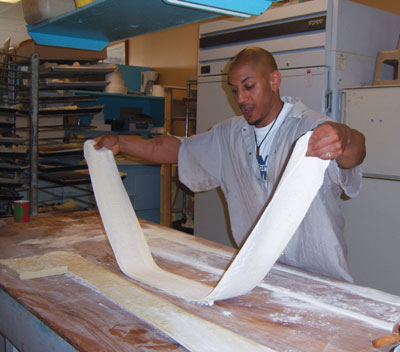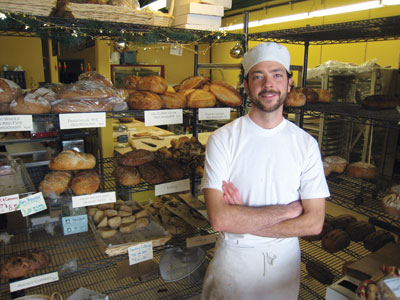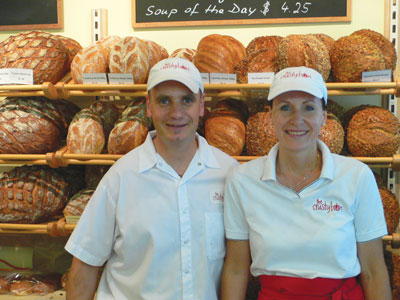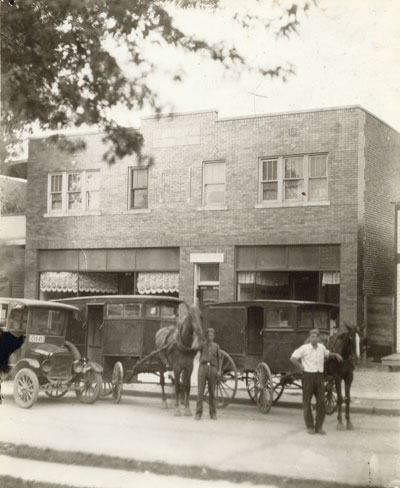
From Coast to coast
August 18, 2011
By Laura Aiken and Brandi Cowen
Take a trip from coast to coast with Bakers Journal as we highlight the diversity and success of bakeries across Canada.
Take a trip from coast to coast with Bakers Journal as we highlight the diversity and success of bakeries across Canada.
Bubby Rose’s Bakery, Victoria, B.C.
With two locations and climbing, Bubby Rose’s Bakery exemplifies giving back to its community. The bakery donates its award winning products to local school fundraisers as well as theatre, arts and environmental groups and various Victoria events. The husband-and-wife team are from Montreal.
What is one of your most memorable moments in the bakery?
Being stopped on the street to be told how valuable we have been as a part of the community.
What are you most proud of when you think of Bubby Rose’s?
Maintaining the integrity of our products by not cutting corners – we use high-quality, natural ingredients, NO chemicals and we make small batches to ensure quality and consistency are as high as we can go!
Paul Larsen, president
Elite Bakery, Burnaby, B.C.
www.elitebakery.ca
 |
|
| West coast Elite Bakery has been serving up delicious Danish treats since 1968.
|
Elite Bakery has been serving up traditional Danish treats since 1968. Founder Magnus (Mark) Larsen left his hometown of Farvejle, Denmark, and travelled to Canada, bringing along an incredible repertoire of recipes and techniques. He ran the bakery until his death in 1997. At that point, Larsen’s son, Paul, took the reins. Today, Elite Bakery sells delicious Danish products from its storefront, and wholesale, through coffee shops, hotels and major retailers like Ikea.
What’s the secret to staying in business for more than 40 years?
I would say the secret would be a high quality consistent product, a community-based atmosphere at the business and loyal customers.
We’re near schools so if we can donate anything towards, let’s say, a picnic for the community, we’re always ready for that. Or if some student wants to come in for work experience as far as baking goes, we always have our doors open. We just try to keep our bakery alive and well in all the events and activities that are going on in the community. Actually, we look for things to donate our products for and sometimes we don’t even tell them where the products came from.
What is your favourite baking memory?
I think my favourite baking memories are the ones I have of baking with my dad. Obviously as a kid, as a teenager, I didn’t appreciate the knowledge my father was passing down to me. Once I had to start running the business myself, I realized how valuable those moments were. I always remember the little tips he used to tell me. Sometimes I’ll remember something that I heard him say and then I apply it to what I’m doing. When he passed away, I wasn’t working for the bakery at the time, so I kind of took it for granted that he owned a bakery. I wasn’t even sure I was going to be a baker.
Suat Tuzlak, owner
Alpine Bakery, Whitehorse
www.alpinebakery.ca
In 1984, Suat Tuzlak announced he was moving from Calgary to Whitehorse and opening a bakery. His friends were skeptical. They pointed to Calgary’s much larger market, and his support network in the city as reasons to set up shop there instead. But Tuzlak heeded the call of the north and followed his dream. Twenty-seven years later, Alpine Bakery is still going strong.
What kinds of challenges do you face in operating a bakery so far up north?
It’s a much smaller market. With the workforce, people come and go here and it’s hard to keep them.
There’s an inconsistent market that’s very much weather oriented. If it’s too cold, they won’t come; if it’s too hot, like we’re having now, they won’t come either. There is a strong tourist business, except during the summer locals go to see relatives in big cities. It doesn’t make up the difference. Summers up here are quieter than the rest of the year.
What’s your favourite baking memory?
Coming to Whitehorse from a big city for the first time. I knew only one person and was doing something I hadn’t done before. That’s excitement. And of course, it all happened because of coming here to open the bakery.
Friends were wondering, ‘Why not in Calgary? It’s a much bigger market.’ The difficulties I was sharing with you wouldn’t have existed in Calgary. There was a strong market and I knew lots of people. It would have been much easier, but the Yukon’s call was one reason to open it here.
Manuel Latruwe, owner/head baker
Manuel Latruwe Belgian Patisserie and Bread Shop, Calgary
http://manuellatruwe.com
This European-style bakery focuses on creating contemporary recipes out of timeless traditions while using high-quality and local ingredients. Manuel Latruwe’s career has taken him to Brussels, Antwerp and France, where he won the Grand prix Internationale de la Patisserie Mandarine Napoleon.
What is your favourite product to bake and why?
Croissants and viennoiserie are my favourite products to make. I love working with the laminated dough, the challenge of the simplicity of the recipe and the complexity of the process that requires a high level of craftsmanship to create that perfect product. Nothing can beat the smell of the perfect croissants and pains au chocolat when they come fresh out of the oven, the crunchiness and satisfaction you experience with the first bite.
What have been the most important factors to your success in preserving your European traditions in Calgary?
The key factors have been my customers and my passion for baking. I have customers who started to come to the store from the first year I opened my bakery in Calgary in 1998 and they still come. I never stop searching for the best ingredients and packaging, improving recipes and training the best employees in order to serve my city the best quality European baking.
Sometimes it means a lot of extra hours and persistence. For example, some ingredients and equipment are very hard to find in Canada. My customers pay me back with their appreciation. The best feeling in the world is when the cashier at Costco reads your name on the membership card and tells you how much their family loves the cake they get for their special family reunions or a couple comes for the wedding photo shoot to your bakery because they had their first date there.
Trent Loewen, owner
Earth Bound Bakery and Delicatessen, Saskatoon
earthboundbakery.blogspot.com/
 |
|
| Saskatoon’s Earth Bound Bakery and Delicatessen found success in organic breads made with local grains.
|
For a bakery located deep in the national breadbasket, working with local grains is a no brainer. Earth Bound Bakery and Delicatessen’s organic breads are all made from Saskatchewan grains, milled by the farmers who grow them.
Why did you decide to open an organic bakery?
Mostly because nobody in the Prairies is really doing it. I got inspired by some local flour producers that I’d known for some time and I just really wanted to use their product, which happened to be organic. It’s value added to the product. Not everybody cares, but those that do care a lot, so as long as it’s a good product and it’s organic, you’re reaching more customers.
What are your bestselling products?
The bestselling is probably my hemp heart and sesame seed bread. It’s a basic country bread like pain de campagne with a pate fermente, and I just add some toasted natural and black sesame with hemp heart. It’s got a nutty flavour, a taste of sesame and hemp and it looks really nice. The top of it is dipped with the mixture, so there’s the black sesame, the white sesame and then the hemp, which is kind of green. It looks almost like camouflage.
Next is the power bread, which has a lightening bolt on it. It has lots of what you would call power grains – hemp, quinoa, amaranth and chia seeds. When I made it first, maybe a year and a half ago, I just wanted to make something that had lots of grains in it. I started using all these grains that are high in omega-3 acids and proteins. It just needed something to adorn it and make it look very unique. My baker Jason said, ‘power like lightening?’ so we did that and it just kind of stuck.
Andreas Ingenfeld and Friederike Brandt, owners
The Crusty Bun Bakery and Café, Winnipeg
www.crustybun.com
 |
|
| Winnipeg’s The Crusty Bun Bakery and Café has become a local institution.
|
After working in their native Germany, as well as in Switzerland, Great Britain, and Japan, the husband-and-wife team behind The Crusty Bun Bakery and Café decided to bring their European-style baking to Canada. Their artisan breads and baked goods have become staples in their adopted community.
You’ve worked all over the world. Why did you decide to set up shop in Canada?
Ingenfeld: The opportunity here was great because there are so many Germans. We are obviously from Germany, and there was no real German bakery – modern bakery – like this. We decided this would be a really great opportunity for us, with our background in German bread and breakfast and those kinds of things.
What’s your bestselling product?
Ingenfeld: Pumpkin seed buns and pumpkin seed breads are our bestsellers. We have a very busy lunchtime, so we do all our sandwiches with our own bread, obviously, and we do our own soup. Everything is made from scratch – no artificial flavours, colouring or preservatives. It’s old-fashioned baking.
Brandt: And the bestselling cake is the bee sting. It’s a yeast dough with a vanilla cream filling – half vanilla, half whipping cream – and roasted almond with honey, hence the bee sting, on top.
If you were in your own kitchen one afternoon and had all the ingredients to make anything you wanted, what would you bake?
Brandt: Develop a new kind of bread or something?
Ingenfeld: Yeah, that’s probably it. What we try to do is always improve our recipes and also try to create new recipes. It’s really important these days to keep the store interesting to the public.
Tony Blak, co-owner
Blak’s Bakery, Windsor, Ont.
 |
|
| Windsor’s Blak’s Bakery is going strong at 93 years young. |
This family-owned bakery has history and has been creating eastern European breads, cakes and pastries in its community for 93 years.
What is the cornerstone of your bakery’s longevity?
We have been in business since 1918, when my grandfather moved to Canada from the U.S. He had immigrated to the U.S. in 1905 and spent 10 years in Rochester, N.Y., working for Denniger Brothers Bakery. He then moved to Detroit for a couple of years before coming to Canada. We still use the original oven he built and in the same location. My sister Valarie Blak-Gill and myself believe in keeping traditional baking alive, and it seems the market is coming full circle and is now demanding better bread all the time.
Perhaps the cornerstone of our longevity is the family values we bring into the business. We learned from an early age to respect our customers and to be thankful to each and every one of them that comes through our doors, or who we deliver to. There are so many choices to where to buy baked goods from so it is a real honour to serve those that choose us.
How has Blak’s kept a passion for baking alive in its store and its people?
Our passion comes from making great bread, rolls and pastries in the same way that my grandfather did in 1918. He learned his trade at the Bristol Hotel in Warsaw, Poland, and brought those talents with him when he came to the new world. Although there have been ways to quicken the baking process, with the likes of no-time doughs, dough conditioners, frozen doughs, instant yeast, some of these have included artificial ingredients. We pride ourselves on using the same techniques we used in 1918 to produce some of the best-tasting rye and wheat breads, we think, in North America. We bake our bread in a brick oven that was originally fired with coke, then coal, and now natural gas. It is approximately 12 by 12 feet, and bakes about 200 [loaves of] bread. We use a 12-foot peel to load the loaves into the oven. A couple of things we do that Grandpa did not, are slice the bread and use plastic bags for packaging it.
It is hard to put into words, but we love what we do, we love how we do it, and we love the customers who enjoy it.
Allyson Meredith Bobbitt and Sarah Bell, owners
Bobbette & Belle Artisanal Pastries, Toronto
www.bobbetteandbelle.com
Allyson Meredith Bobbitt and Sarah Bell are the dynamic duo behind Bobbette & Belle, an artisan patisserie specializing in wedding and special occasion cakes and French macarons. Bell is a frequent guest on The Marilyn Dennis Show. Bobbitt’s cakes have been featured in Wedluxe Magazine and Weddingbells magazine, and earned her the Canadian Wedding Industry Awards’ Cake Designer of the Year honour.
What’s the most memorable cake you’ve created?
Bobbitt: I created a wedding cake a couple of years ago that was five feet tall and over 300 pounds. The thousands of handmade sugar cherry blossoms that decorated it took over two months to make.
What’s your favourite baking memory so far?
Bell: I used to love baking with my mom! It was always torture having to wait for the chocolate chip cookies to bake. I used to love cracking eggs for cookie batters and cake batters when I was a little girl, along with licking the spoon. I was so happy when I was able to start baking by myself in the kitchen and the first time I ever baked a cake, it rose higher than my mother’s!
If you could go back in time to when you were first getting the bakery started and give yourselves one piece of advice, what would it be?
Bobbitt: I would tell ourselves to be aware of how quickly a business can expand and have a plan for having the appropriate number of staff on hand. When you open a new business, the focus tends to be on making sure that the venture doesn’t fail, but you should also plan for great success!
Peter Morentzos, founder
Montreal Bread Company, Montreal
www.mbco.ca
The Montreal Bread Company offers modern European fare, guided by the philosophy that “dining has become a form of entertainment and serving a new breed of patron has become an art.” Don’t be fooled by the name. The Montreal Bread Company has a global reach, with locations in Toronto, Ottawa, Chicago, Dubai, Qatar and Saudi Arabia either already in business, or slated to open soon.
Which products have been your best sellers so far this year? Are the best sellers the same across all locations?
As far as baked products, our baked muffins and my torsade are the two products that seem to be a global success. Our muffins are all natural, no preservatives, and baked fresh everyday. We call it the “boutique muffin.” The torsade is an addiction – you have one and it’s over!
What’s your favourite baking memory?
It’s not so much my memory, but watching my chefs and my pastry chef orchestrate the menu of this concept was quite special. It’s amazing. There are no boundaries with love and sugar. How can you go wrong?
What’s your favourite thing to bake?
Croissant! This is one product that, if you catch it at the perfect time coming out of the oven, there is nothing more perfect. It’s a very temperamental product, so a lot of pride goes into this product. Most people wouldn’t know if it was a degree off this way or slightly overdone or undercooked that way, but I did, which made it more special to boast about it. It’s as if you discovered gold under your feet.
Richard Boschel, owner/manager
24 Carrots Bakery, Halifax, N.S.
http://24carrotsbakery.com
![p10_24CB_1[1] p10_24CB_1[1]](/images/stories/2011/augustseptember11/p10_24CB_1[1].jpg) |
|
| Halifax’s 24 Carrots Bakery grew from one food court outlet into busy wholesale supplier.
|
Richard Boschel completed his apprenticeship in France, and after years as an executive chef, he started 24 Carrots Bakery as a small food court outlet in 1994. The bakery grew into a well-established family owned and operated wholesale operation that serves up specialty breads and baked goods to its local community customers.
What do you enjoy most about having a bakery in Halifax?
I like the lobster! I sell lots of buns for making lobster rolls. I like the friendly atmosphere, I like the people and I like the pace of life.
What are some of the challenges of being a wholesale bakery on the east coast?
Well, there’s a few. Population is one, it would be good to have more population. But we’re local so we do a good business. It can be hard to find experienced people to work in the bakery. We have good, qualified people but it’s hard to replace them if they leave. Sometimes it would be nice to have Toronto’s population!
What do you love most about being a baker?
Customer relations. I’m a customer kind of guy.
T.J. Peach, owner
Susie’s Shortbreads, Halifax, N.S.
www.susiesshortbreads.com
This specialty cookie and cupcake shop peddles its sweet treats from two storefronts, as well as at the Halifax Seaport Farmers’ Market every Saturday.
From April through September, the bright pink Susie’s Mobile Cupcake Truck also sells the bakery’s goods at community events and private functions throughout the Halifax area.
For years, trend spotters have been predicting that the heyday of the cupcake craze has come and gone. Do you think that’s true, or are cupcakes here to stay?
I really don’t think that’s true. Every time I hear that, I have a good laugh because to me, the new cupcake is the cupcake.
There are so many ways to keep inspiring the cupcake to make it new. So, sure, the cupcake has been around for centuries, but the twists that bakers are putting on it are really giving it a modern spin and you can continue with your flavour profiles to adapt it to any setting. It is an individual portion-sized dessert – I think that is the appeal of the cupcake.
How often do you get into the kitchen to develop an entirely new formulation?
Not so much now. Our business is about six years old, but for the first while, I spent a good year testing and developing and really perfecting what we thought was the best tasting cupcake recipe. From there I’ve played with flavours over the years to come up with new flavour combinations.
When we started, we had under 40 flavours, I’m now over 100. I’m at that point where I try not to add too many any more, just because we have such sheer volume that it leads to disappointment when people want a certain flavour but we can’t rotate through enough to bring it to them.
If you could go back to when you were first getting the business started and give yourself one piece of advice, what would it be?
Don’t try to please everyone, because you can’t. Really concentrate on who it is that you want to serve and focus on that niche market, rather than trying to be too many things to too many people.
Print this page
Leave a Reply